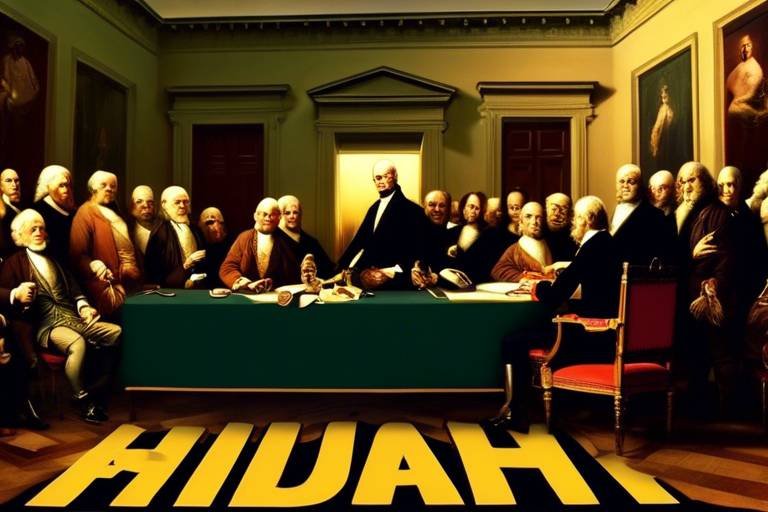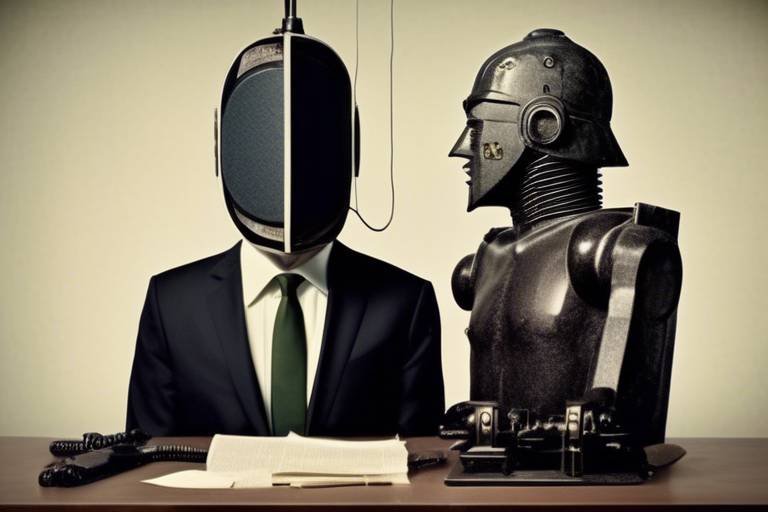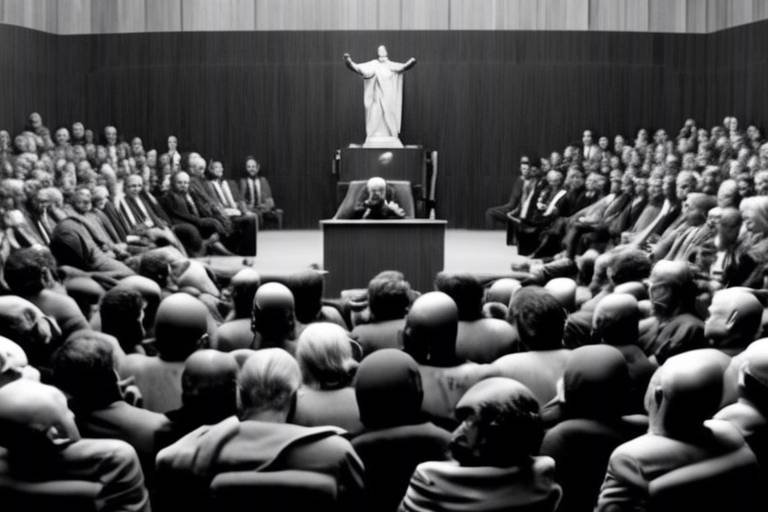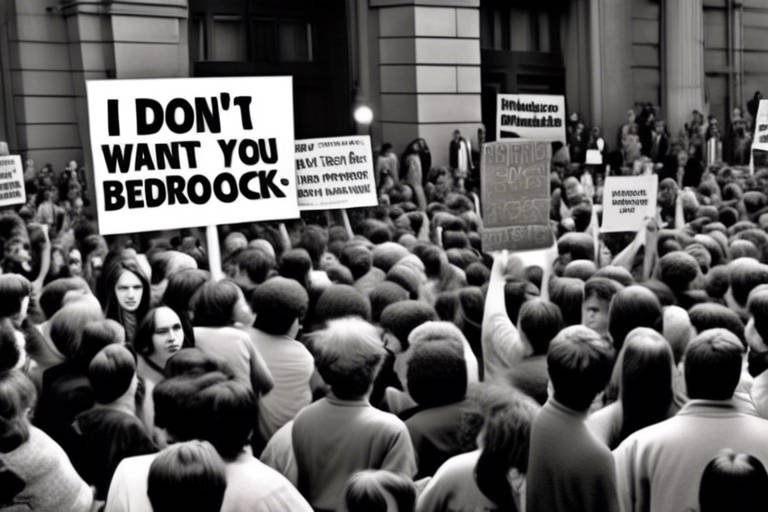Misuse of Power - A Philosophical Examination in Politics
The concept of power misuse in politics is as old as governance itself. It’s a phenomenon that transcends borders, cultures, and eras, leaving a trail of consequences that often shape the very fabric of societies. But what does it mean when we talk about the misuse of power? Is it merely about authority being abused, or does it encompass a broader spectrum of ethical dilemmas and societal implications? In this article, we will embark on a journey to explore the intricate layers of power misuse, delving into its philosophical roots, historical contexts, and the ethical responsibilities that come with authority.
To grasp the essence of power misuse, we must first distinguish between power and authority. Power can be seen as the ability to influence or control the behavior of people, while authority is the recognized right to exercise that power. This distinction is crucial in political philosophy, as it sets the stage for understanding governance and societal structures. When power is exercised without the moral backing of authority, it often leads to misuse, creating a rift between leaders and the populace they govern. This dynamic raises essential questions: How do we ensure that those in power remain accountable? What mechanisms are in place to prevent the corruption of authority?
History is replete with examples of power misuse, each telling a story of caution and consequence. From the tyrants of ancient civilizations to modern-day leaders who exploit their positions, the lessons learned from these events are invaluable. For instance, the fall of the Roman Empire can be attributed, in part, to the excesses of its leaders who misused their power for personal gain. This historical overview not only highlights the consequences faced by societies but also serves as a reminder of the importance of vigilance in governance. As we reflect on these events, we must ask ourselves: What can we learn from the past to safeguard our future?
Throughout history, certain leaders have become infamous for their blatant misuse of power. By examining their actions and motivations, we can gain insights into the broader implications of such behavior. For example, consider the reign of Joseph Stalin, whose totalitarian regime was marked by purges and oppression. His desire for control led to the suffering of millions, illustrating how the misuse of power can have devastating effects on a nation and its people. On the other hand, leaders like Nelson Mandela, who rose from oppression to promote reconciliation, remind us of the potential for positive change when power is wielded responsibly.
Dictatorships and totalitarian regimes serve as extreme examples of power misuse. These governments often employ tactics such as censorship, propaganda, and violence to maintain control. Philosophers like Hannah Arendt have explored the justifications used by such regimes to legitimize their actions, often framing them as necessary for national security or societal stability. However, history has shown us that these justifications can lead to widespread human rights abuses and societal decay.
Surprisingly, democracies are not immune to the misuse of power. Corruption can seep into the very foundations of democratic institutions, eroding public trust and undermining the principles of accountability. When elected officials prioritize personal gain over the common good, the democratic process falters. This subtle erosion of trust can lead to disillusionment among citizens, prompting them to question the very system that was designed to empower them. How can we combat this insidious form of power misuse? The answer lies in fostering a culture of transparency and accountability.
Philosophers have long grappled with the nature of power and its implications in politics. Thinkers like Machiavelli posited that the ends justify the means, while Foucault examined how power dynamics shape societal norms. Arendt’s work on totalitarianism highlights the dangers of unchecked authority. By engaging with these theories, we can better understand the complexities of power and the ethical considerations that come into play. What does it mean to wield power responsibly? This question is at the heart of our exploration.
Ethics plays a pivotal role in the exercise of power. Political authority is not merely about governance; it encompasses a moral obligation to uphold the values of justice, fairness, and integrity. Leaders are tasked with the responsibility to act in the best interests of their constituents, and when they fail to do so, the repercussions can be dire. The intersection of moral philosophy and political authority raises critical questions about the ethical standards expected of those in power. Are our leaders held to the same ethical standards as the rest of us?
When political leaders abandon ethical principles, the consequences can be catastrophic. Case studies abound where ethical failures have led to societal harm, such as the Watergate scandal, which not only damaged public trust in government but also set a precedent for accountability. The erosion of trust can have lasting effects, leading to apathy and disengagement among citizens. It’s essential for us to recognize these patterns and advocate for the ethical conduct of our leaders.
Addressing past abuses of power requires a commitment to restorative approaches. Reconciliation, accountability, and rebuilding trust in political institutions are vital steps toward healing societal wounds. Initiatives that promote open dialogue and acknowledgment of past wrongs can pave the way for a more equitable future. It’s not just about punishing those who have misused power; it’s about creating a system that fosters integrity and respect for all.
- What is the difference between power and authority? Power is the ability to influence others, while authority is the recognized right to do so.
- Can democracies misuse power? Yes, democracies can experience corruption and misuse of power, undermining public trust.
- How can societies prevent power misuse? By promoting transparency, accountability, and ethical leadership.
- What are the consequences of ethical failures in politics? They can lead to societal harm, loss of trust, and disengagement from the political process.

Defining Power and Authority
Understanding the distinction between power and authority is crucial in political philosophy, as these concepts form the backbone of governance and societal structures. At its core, power can be seen as the ability to influence or control the behavior of people and the course of events. It's like having a remote control for a television; the person in possession of it can change channels, adjust the volume, or even turn the device off. In politics, power is often wielded by individuals or groups who can dictate laws, policies, and societal norms.
On the other hand, authority is a more nuanced concept. It refers to the recognized right to exercise power. Think of authority as the legitimacy behind the remote control. Just because someone has the power to change the channel doesn’t mean they have the authority to do so if they’re not the owner of the television. In political terms, authority is often derived from legal statutes, social contracts, or moral principles. This distinction is essential because it shapes how we perceive leaders and institutions. When authority is respected, power is exercised more effectively, leading to a stable society.
To further illustrate the relationship between power and authority, consider the following table:
| Aspect | Power | Authority |
|---|---|---|
| Definition | Ability to influence or control | Recognized right to exercise power |
| Source | Can be acquired through force or coercion | Derived from laws, social norms, or ethics |
| Legitimacy | May lack legitimacy | Generally accepted and respected |
| Examples | Military force, economic power | Government officials, judges |
In political contexts, the interplay between power and authority can lead to complex dynamics. When leaders misuse their power, they often do so by overstepping their authority, leading to a breakdown in trust and social cohesion. This misuse can manifest in various ways, ranging from authoritarian rule to the subtle erosion of democratic principles. Understanding how these two concepts interact helps us critically analyze political systems and the behavior of those in power.
Moreover, the ethical implications of power and authority cannot be overlooked. Leaders are often faced with moral dilemmas that challenge their authority and the way they wield power. For instance, a leader may have the power to enact policies that benefit a select few at the expense of the larger population. Here, the ethical question arises: just because they can, does it mean they should? This intersection of ethics and authority is where the philosophical examination of power becomes particularly fascinating.
In conclusion, defining power and authority is not only about understanding their individual characteristics but also about recognizing their relationship and implications in political philosophy. As we delve deeper into the misuse of power in politics, these definitions will serve as a foundation for exploring the broader consequences of authority in governance.
- What is the difference between power and authority? Power refers to the ability to influence or control, while authority is the recognized right to exercise that power.
- Can power exist without authority? Yes, power can exist through coercion or force even if it lacks legitimacy.
- Why is understanding power and authority important in politics? It helps analyze political systems and the behavior of leaders, especially regarding the ethical implications of their actions.

Historical Perspectives on Power Misuse
Throughout history, the misuse of power has manifested in various forms, often leading to dire consequences for societies. From ancient empires to modern democracies, the patterns of power abuse reveal critical lessons about governance and human behavior. When we examine these historical contexts, we can see that power, when unchecked, can transform into a weapon of oppression rather than a tool for societal good. This section delves into notable events characterized by power misuse, helping us understand the importance of vigilance in political authority.
One of the most striking examples is the rise and fall of the Roman Empire. As the empire expanded, so did the corruption among its leaders. Emperors like Nero and Caligula exemplified the extremes of power misuse, indulging in extravagance while their citizens suffered. The consequences were severe; societal trust eroded, leading to revolts and ultimately the empire's decline. This historical episode serves as a cautionary tale, reminding us that when leaders prioritize personal gain over public welfare, the fabric of society begins to unravel.
Another significant instance is the French Revolution, which was initially sparked by the desire for equality and justice. However, as the revolution progressed, power shifted into the hands of the Committee of Public Safety, leading to the Reign of Terror. The very ideals of liberty and fraternity were overshadowed by violence and paranoia, showcasing how revolutionary fervor can quickly devolve into tyranny. Here, we see a poignant reminder that even movements aimed at liberation can fall prey to the misuse of power.
In the 20th century, the rise of totalitarian regimes, such as Nazi Germany and Stalinist Russia, further illustrates the catastrophic effects of power misuse. These regimes employed propaganda, censorship, and state violence to maintain control, often justifying their actions as necessary for national security or ideological purity. The chilling consequences of these abuses are etched in history, with millions suffering and dying as a result of unchecked authority. The philosophical justifications used by these leaders often mask the underlying ethical failures, leading us to question the moral implications of their actions.
To better understand these historical perspectives, we can summarize key events and their implications in the following table:
| Event | Leader/Regime | Type of Power Misuse | Consequences |
|---|---|---|---|
| Roman Empire Decline | Nero, Caligula | Corruption, Excess | Revolts, Societal Trust Erosion |
| French Revolution | Committee of Public Safety | Terror, Violence | Loss of Liberty, Tyranny |
| Nazi Germany | Adolf Hitler | Propaganda, Censorship | Genocide, War |
| Stalinist Russia | Joseph Stalin | State Violence, Repression | Mass Suffering, Death |
These historical events underscore the critical need for accountability and ethical governance. As we reflect on these lessons, we must ask ourselves: how can we ensure that power is wielded responsibly in our current political climate? The echoes of history remind us that vigilance is essential; we must remain engaged and informed to prevent the repetition of past mistakes.
- What is the difference between power and authority?
Power refers to the ability to influence or control others, while authority is the recognized right to make decisions and enforce obedience. - How can societies prevent the misuse of power?
Establishing strong institutions, promoting transparency, and ensuring accountability are key measures to prevent power misuse. - What are some modern examples of power misuse?
Examples include political corruption, abuse of civil rights, and the manipulation of electoral processes. - Why is historical perspective important in understanding power dynamics?
Historical perspectives provide context, helping us learn from past mistakes and recognize patterns that may recur in the future.

Case Studies of Notable Leaders
Throughout history, the misuse of power has manifested in various forms, often leading to dire consequences for nations and their citizens. By examining the actions of notable leaders, we can gain insights into the motivations behind their decisions and the ripple effects these decisions create. One prominent example is Adolf Hitler, whose totalitarian regime in Nazi Germany showcased the catastrophic results of unchecked power. His ability to manipulate public sentiment and employ propaganda not only facilitated his rise to power but also led to the implementation of policies that resulted in the deaths of millions. The ethical implications of his actions continue to spark discussions about the responsibilities of leaders and the moral boundaries of political authority.
Another significant case is that of Joseph Stalin, whose reign over the Soviet Union was marked by widespread purges, forced labor camps, and a climate of fear. Stalin's consolidation of power was characterized by brutal tactics that eliminated opposition and instilled loyalty through terror. This misuse of power not only devastated the lives of countless individuals but also shaped the political landscape of the 20th century. The philosophical questions raised by Stalin's actions challenge us to consider the nature of authority and the ethical obligations of those who wield it.
On the other hand, we can look at leaders in democratic contexts who have also misused their power, albeit in more subtle ways. For instance, Richard Nixon's presidency was marred by the Watergate scandal, where the abuse of executive power and subsequent cover-up efforts led to a profound crisis of trust in American political institutions. Nixon's actions serve as a reminder that even in democracies, power can be misused, and the erosion of ethical standards can have far-reaching consequences.
To further illustrate the impact of power misuse, we can analyze a table summarizing key leaders and their actions:
| Leader | Country | Period | Type of Power Misuse | Consequences |
|---|---|---|---|---|
| Adolf Hitler | Germany | 1933-1945 | Totalitarianism, Genocide | World War II, Holocaust |
| Joseph Stalin | Soviet Union | 1924-1953 | Dictatorship, Purges | Great Terror, Famine |
| Richard Nixon | United States | 1969-1974 | Corruption, Abuse of Power | Resignation, Watergate Scandal |
These case studies reveal that the misuse of power is not confined to one political system or ideology. Rather, it is a pervasive issue that transcends borders and time periods. Each leader's actions prompt us to reflect on the ethical dimensions of power and the importance of accountability. As we analyze these historical figures, we must ask ourselves: what lessons can we learn to prevent similar abuses in the future? How can societies hold their leaders accountable and ensure that power is exercised responsibly?
In conclusion, the examination of notable leaders who misused their power serves as a critical reminder of the potential consequences of authority unchecked by ethical considerations. As we navigate the complexities of governance today, it is essential to remain vigilant and advocate for transparency, accountability, and the ethical exercise of power.
- What constitutes the misuse of power in politics?
The misuse of power in politics refers to actions taken by leaders that violate ethical standards, exploit authority for personal gain, or harm citizens, often resulting in significant societal consequences. - Can power misuse occur in democratic systems?
Yes, power misuse can occur in democracies, often through corruption, lack of accountability, or erosion of ethical standards, highlighting the need for vigilant oversight and citizen engagement. - What are the long-term impacts of power misuse?
The long-term impacts can include loss of public trust, societal divisions, and even historical trauma, making it essential for societies to address and rectify past abuses.

Dictatorships and Totalitarian Regimes
When we think about dictatorships and totalitarian regimes, images of oppression and fear often come to mind. These systems of governance represent the extreme misuse of power, where authority is concentrated in the hands of a single leader or a small group. In such regimes, the line between governance and tyranny becomes blurred, leading to a society where dissent is not just discouraged but brutally suppressed. The tactics employed by these leaders are often sophisticated and chilling, designed to maintain control at any cost.
At the core of these regimes is the philosophy that power must be absolute and unchallenged. Leaders often justify their actions with the notion that they are acting in the best interest of the state. This warped sense of duty can lead to horrific consequences, both for individuals and for society as a whole. For instance, the use of propaganda is a common tool in the arsenal of dictators, shaping public perception and silencing opposition by controlling the narrative. The following table illustrates some notorious examples of tactics used by totalitarian regimes:
| Tactic | Description | Historical Example |
|---|---|---|
| Propaganda | Manipulating information to control public perception | Nazi Germany |
| Surveillance | Monitoring citizens to prevent dissent | East Germany (Stasi) |
| Political Repression | Imprisoning or eliminating political opponents | North Korea |
| Control of Media | Restricting access to information and free press | China |
These regimes thrive on the fear they instill in their citizens. The absence of freedom and the presence of constant surveillance create a society where people are too afraid to speak out, let alone challenge authority. It’s a vicious cycle: the more power is misused, the more fear it generates, leading to an even tighter grip on control. This reality raises an important question: how can societies allow themselves to fall into such traps? Often, it starts with a gradual erosion of democratic principles, where the populace becomes complacent, believing that the status quo is preferable to the uncertainty that change might bring.
Moreover, the philosophical justifications for these regimes can be perplexing. Thinkers like Hannah Arendt have examined how totalitarianism can emerge from a vacuum of political responsibility, where leaders exploit crises to consolidate their power. The justification often hinges on the idea that a strong hand is necessary to guide a nation through turmoil. However, history shows us that such justifications are rarely legitimate and often lead to catastrophic outcomes.
In essence, dictatorships and totalitarian regimes serve as stark reminders of the dangers of unchecked power. They challenge us to consider the importance of accountability, transparency, and the role of the citizen in holding leaders to their promises. As we reflect on these regimes, it becomes clear that the fight against the misuse of power is not just a political struggle; it is a moral one that requires vigilance, education, and a commitment to the principles of justice and human rights.
- What is the difference between a dictatorship and a totalitarian regime? A dictatorship typically refers to a government led by a single leader with significant power, while a totalitarian regime seeks to control all aspects of public and private life, often through oppressive measures.
- Can democracies also become totalitarian? Yes, democracies can slide into totalitarianism if democratic principles are eroded over time, often through corruption and the concentration of power.
- What are some historical examples of totalitarian regimes? Notable examples include Nazi Germany, Stalinist Soviet Union, and North Korea.

Democratic Failures and Corruption
When we think about democracy, we often envision a system where the voice of the people reigns supreme, where leaders are held accountable and transparency is the norm. However, the stark reality is that democracies can and do experience significant failures, often fueled by corruption. This corruption can manifest in various forms, from the blatant bribery of officials to the more insidious manipulation of laws and policies. The erosion of democratic principles can be gradual, almost like a slow leak that eventually leads to a flood of disillusionment among the populace.
One of the most alarming aspects of corruption in democracies is how it undermines public trust. When citizens see their elected officials engaging in corrupt practices, it creates a sense of betrayal. This feeling can lead to widespread apathy, where people feel that their votes and voices don't matter. The irony is that the very foundation of democracy—active participation and engagement—begins to crumble under the weight of corruption. It’s like watching a well-tended garden turn into a wild, unmanageable jungle, where weeds of deceit choke out the flowers of integrity.
Consider the following examples of how democratic failures can take root:
- Election Fraud: Manipulating electoral processes to favor certain candidates or parties can lead to a distorted representation of the electorate's will.
- Lobbying and Special Interests: When corporations and wealthy individuals exert undue influence over politicians, it can skew policies in favor of the few rather than the many.
- Judicial Corruption: When the judiciary is compromised, the rule of law is undermined, leading to a lack of justice for ordinary citizens.
These issues are not merely theoretical; they have real-world consequences. For instance, in some countries, the manipulation of electoral systems has led to civil unrest and a loss of faith in governmental institutions. The public's response can range from peaceful protests to violent uprisings, showcasing the deep-seated frustration that arises when democracy fails to deliver on its promises.
Moreover, the subtle erosion of democratic norms often goes unnoticed until it's too late. Citizens may become accustomed to small compromises—like tolerating a little bit of favoritism or overlooking minor ethical breaches—only to find that these small issues snowball into a culture of corruption that is difficult to dismantle. It's akin to a slow poison that seeps into the system, affecting everything from policy-making to the public's trust in government.
To combat these democratic failures, accountability must become a cornerstone of governance. Mechanisms such as independent oversight bodies, robust whistleblower protections, and transparent reporting can help restore faith in democratic institutions. As citizens, we must remain vigilant and demand transparency from our leaders, ensuring that they understand that they are not above the law.
Ultimately, the fight against corruption in democracies is not merely a political issue; it is a moral one. Upholding ethical standards in governance is essential for maintaining the integrity of democratic systems. Without a commitment to ethics, the very essence of democracy—serving the public interest—becomes compromised. Thus, it is imperative that both leaders and citizens work together to foster a political culture that prioritizes integrity and accountability, ensuring that democracy serves its true purpose.
- What is corruption in a democratic context? Corruption refers to the abuse of power by government officials for personal gain, undermining the principles of democracy.
- How can citizens combat corruption? Citizens can combat corruption by being informed, participating in elections, and advocating for transparency and accountability in government.
- What are the consequences of corruption? Corruption can lead to a loss of public trust, weakened institutions, and ultimately, a failure of the democratic system.

Philosophical Theories on Power
When we dive into the intricate world of political philosophy, the theories surrounding power emerge as a crucial element in understanding human governance and authority. One of the most notable thinkers in this realm is Niccolò Machiavelli, whose work, "The Prince," provides a pragmatic, if not ruthless, perspective on power dynamics. Machiavelli argues that the ends often justify the means, suggesting that leaders may need to engage in morally questionable actions to maintain control and ensure stability. This perspective raises a provocative question: Is it acceptable for leaders to compromise their ethics for the sake of political stability?
Moving forward, we encounter the ideas of Michel Foucault, who revolutionized our understanding of power by asserting that it is not merely possessed but rather exercised through relationships and social structures. Foucault introduces the concept of power/knowledge, emphasizing that knowledge itself is a form of power, shaping societal norms and behaviors. This theory challenges us to consider how institutions, such as schools and prisons, wield power not just through force but through the dissemination of knowledge and the construction of truths. In this light, we must ask ourselves: How do the narratives we accept shape our understanding of authority?
Another significant voice in this discourse is Hannah Arendt, who offers a distinct perspective by focusing on the nature of power as something that arises from collective action rather than individual dominance. Arendt posits that true power is rooted in the ability of individuals to act together, highlighting the importance of public engagement and civic participation. This raises an essential point: Can power be reclaimed by the people, and if so, how can they effectively mobilize to challenge oppressive structures?
To further illustrate these theories, let's consider a comparative table that summarizes the key ideas of these philosophers:
| Philosopher | Key Concept | Implications |
|---|---|---|
| Niccolò Machiavelli | Ends Justify the Means | Leaders may act immorally to maintain power. |
| Michel Foucault | Power/Knowledge | Power is exercised through social relationships and knowledge. |
| Hannah Arendt | Power in Collective Action | True power emerges from collective human action. |
These philosophical theories not only shape our understanding of power but also invite us to reflect on our roles within political systems. They compel us to question the nature of authority and the ethical responsibilities that come with it. As we navigate the complexities of modern governance, the insights from Machiavelli, Foucault, and Arendt remain relevant, challenging us to consider how power can be wielded responsibly and justly.
In conclusion, the exploration of philosophical theories on power reveals a rich tapestry of ideas that inform our understanding of authority and governance. Whether we lean towards Machiavelli's pragmatic realism, Foucault's nuanced analysis of power dynamics, or Arendt's emphasis on collective agency, each perspective offers valuable insights into the ongoing dialogue about power in politics.
- What is the main idea behind Machiavelli's theory of power?
Machiavelli argues that leaders may need to engage in unethical actions to maintain control and stability in governance. - How does Foucault redefine the concept of power?
Foucault suggests that power is not just held by individuals but is exercised through social relationships and the dissemination of knowledge. - What does Arendt mean by power arising from collective action?
Arendt believes that true power comes from individuals acting together, highlighting the importance of civic engagement in politics.

The Role of Ethics in Politics
When we think about politics, the first thing that often comes to mind is power. However, lurking just beneath the surface is an equally important element: ethics. The intertwining of ethics and politics is like a dance; when one partner steps out of line, the entire performance can falter. Ethics in politics is not merely a theoretical concept; it is the foundation that upholds the integrity of political systems. Without a strong ethical framework, the very fabric of governance can unravel, leading to corruption, abuse of power, and a profound loss of public trust.
Ethics serves multiple roles in the political arena. Firstly, it provides a moral compass for leaders and policymakers, guiding their decisions and actions. Imagine a ship sailing through stormy seas; the captain must rely on their compass to navigate safely. Similarly, political leaders must adhere to ethical principles to steer their nations towards justice and equity. Secondly, ethics fosters accountability. When leaders are held to ethical standards, they are more likely to act in the best interest of their constituents rather than succumbing to personal or political gain.
Moreover, the ethical landscape in politics is shaped by various factors, including cultural norms, societal values, and historical contexts. For instance, in some cultures, political loyalty may overshadow ethical considerations, leading to a culture of impunity. In contrast, societies that prioritize ethical governance often witness higher levels of public trust and civic engagement. This dynamic is crucial because when citizens believe their leaders act ethically, they are more likely to participate in the democratic process, vote, and advocate for their rights.
To illustrate the significance of ethics in politics, consider the following table that summarizes key ethical principles and their implications for political leadership:
| Ethical Principle | Description | Implications for Political Leadership |
|---|---|---|
| Integrity | Adherence to moral and ethical principles. | Fosters public trust and credibility. |
| Transparency | Openness in decision-making processes. | Encourages accountability and public scrutiny. |
| Fairness | Impartial treatment of all individuals. | Promotes social justice and equality. |
| Responsibility | Being accountable for one's actions. | Ensures leaders are answerable to the public. |
Despite the clear importance of ethical governance, the political landscape is often riddled with ethical failures. These failures can have devastating consequences, not only for the political leaders involved but also for the wider society. When ethics are compromised, the repercussions can ripple through communities, leading to disillusionment and a breakdown of trust in political institutions. For example, consider the fallout from major corruption scandals; they often result in public outrage, protests, and a significant decline in voter turnout. In essence, when ethics are sidelined in politics, the very essence of democracy is threatened.
However, it is not all doom and gloom. There are numerous restorative approaches that can be employed to mend the ethical breaches in politics. Reconciliation processes, for instance, can help rebuild trust between leaders and the public. Additionally, implementing robust accountability measures and ethical training for public officials can create a culture of integrity. Just as a gardener tends to their plants, nurturing them to flourish, society must cultivate ethical practices in politics to ensure a healthy democratic environment.
- Why is ethics important in politics?
Ethics is crucial because it guides leaders in making decisions that are fair, just, and in the best interest of the public, thereby fostering trust and accountability. - What are some common ethical failures in politics?
Common ethical failures include corruption, abuse of power, lack of transparency, and favoritism, which can lead to significant societal harm. - How can societies promote ethical governance?
Promoting ethical governance can be achieved through education, transparency initiatives, and holding leaders accountable for their actions.

Consequences of Ethical Failures
When we talk about ethical failures in politics, we're not just discussing abstract ideas; we're diving into the real-world consequences that ripple through society. Ethical failures can lead to a breakdown of trust between the government and its citizens, and this erosion of trust can have profound implications. Imagine a bridge that’s been poorly constructed; it may hold for a while, but eventually, it will collapse, causing chaos and destruction. Similarly, when political leaders fail to uphold ethical standards, it creates instability that can shake the very foundations of society.
One of the most immediate consequences of ethical failures is the loss of public trust. Citizens expect their leaders to act with integrity and transparency. When these expectations are not met, the public's confidence in political institutions dwindles. This loss of trust can manifest in various ways, including decreased voter turnout, increased political apathy, and a general sense of disillusionment with the democratic process. In extreme cases, it can even lead to civil unrest, as people feel compelled to take to the streets to voice their frustration against perceived injustices.
Moreover, ethical failures can lead to corruption, which often becomes systemic. When leaders prioritize personal gain over the common good, it creates an environment where unethical behavior is not only tolerated but expected. This can result in a vicious cycle where corruption breeds more corruption, making it incredibly challenging to restore ethical standards. For instance, consider the infamous political scandals that have rocked nations worldwide; they often start with a single unethical decision that spirals out of control, leading to widespread implications for governance and society.
In addition to the erosion of trust and the rise of corruption, ethical failures can result in significant societal harm. Policies enacted under the influence of unethical behavior can lead to inequality, injustice, and even violence. For example, when leaders make decisions based on favoritism or bribery, it can result in the misallocation of resources, leaving vulnerable populations even more exposed to hardship. This not only affects those directly impacted but also has long-term effects on societal cohesion and stability.
To illustrate these consequences, let's consider a few high-profile cases:
| Case Study | Consequences |
|---|---|
| Watergate Scandal (U.S.) | Loss of trust in government, resignation of a president, and increased cynicism towards political institutions. |
| Enron Scandal (U.S.) | Bankruptcy of a major corporation, loss of jobs, and a crisis in the accounting profession. |
| Corruption in Brazil (Operation Car Wash) | Political instability, mass protests, and a significant decrease in public trust in politicians. |
As we can see, the ramifications of ethical failures extend far beyond the immediate political sphere. They affect the fabric of society, leading to a cycle of distrust and instability that can take years, if not decades, to mend. Therefore, it is imperative for political leaders to recognize the weight of their decisions and the ethical implications that come with power. The responsibility lies not only in making decisions but also in ensuring those decisions are made with integrity and a commitment to the public good.
Ultimately, the consequences of ethical failures serve as a stark reminder of the importance of accountability in politics. Without it, we risk falling into a cycle of disillusionment and chaos, where the very essence of democracy is at stake. It is crucial for citizens to remain vigilant and demand ethical leadership to foster a healthier political environment.
- What are some common signs of ethical failure in politics? Common signs include lack of transparency, increased corruption, and a noticeable disconnect between leaders and the public.
- How can citizens hold their leaders accountable? Citizens can engage in activism, vote, and support organizations that promote transparency and ethical governance.
- What role does media play in exposing ethical failures? Media serves as a watchdog, investigating and reporting unethical behavior, thus informing the public and prompting accountability.

Restorative Approaches to Power Misuse
When we talk about , we're diving into a realm that seeks not just to address the past but to pave the way for a more ethical future. Imagine a world where political leaders recognize their missteps and take tangible steps to mend the fabric of society they’ve torn. This idea, while idealistic, is grounded in the belief that accountability and healing can coexist. Restorative justice, often used in criminal contexts, can be applied to political misdeeds, fostering an environment where dialogue replaces hostility and reconciliation supersedes retribution.
One of the core tenets of restorative approaches is the emphasis on accountability. This isn’t just about punishing wrongdoers; it’s about encouraging them to acknowledge their actions and the harm they’ve caused. For instance, when leaders are willing to admit their faults, it opens the door for public discourse. This dialogue can lead to a better understanding of the consequences of their actions, not just for themselves but for the communities they govern. It’s akin to a parent admitting a mistake to their child – it builds trust and sets a precedent for honesty.
Moreover, restorative approaches often involve the community in the healing process. By engaging citizens in discussions about power dynamics, leaders can foster a sense of collective responsibility. This can take many forms, such as town hall meetings, public forums, or even online platforms where citizens can voice their concerns and suggestions. The goal is to create a space where everyone feels heard and valued, thus breaking down the barriers that power misuse often erects. In this way, the community becomes a partner in governance rather than just passive observers.
Another essential aspect of restorative approaches is the concept of reconciliation. This goes beyond mere acknowledgment of wrongdoing; it requires a commitment to making amends. For example, if a leader has misused their power to benefit a select few at the expense of the many, they might implement policies aimed at redistributing resources or providing reparations to affected communities. Such actions can serve as a powerful reminder that those in power have a responsibility to serve the greater good, not just their interests.
To illustrate how these principles can be applied, consider the following table that outlines potential restorative measures alongside their intended outcomes:
| Restorative Measure | Intended Outcome |
|---|---|
| Public Apologies | Restoring trust and acknowledging harm done |
| Community Engagement Initiatives | Fostering dialogue and collective responsibility |
| Policy Reforms | Addressing systemic issues that led to power misuse |
| Reparations Programs | Compensating affected communities and individuals |
In addition to these measures, it’s vital to incorporate education into the restorative process. Teaching future leaders about ethical governance and the implications of power misuse can help cultivate a new generation that values integrity and accountability. Workshops, seminars, and even curriculum changes in educational institutions can play a significant role in this transformation. After all, if we want to prevent the misuse of power in the future, we must equip our leaders with the tools to recognize and resist such temptations.
Ultimately, restorative approaches to power misuse are about creating a culture of transparency and responsibility. It’s a call to action for both leaders and citizens to engage in a continuous dialogue about power dynamics and their societal implications. By fostering an environment where mistakes are acknowledged and addressed, we can work towards a political landscape that prioritizes the well-being of all its constituents. This journey is not easy, but it is essential for building a resilient and ethical society.
- What is meant by restorative approaches to power misuse? These approaches focus on acknowledging past wrongs, fostering accountability, and engaging communities in the healing process to prevent future abuses of power.
- How can community engagement help in addressing power misuse? By involving citizens in discussions about governance, leaders can build trust and create a sense of collective responsibility, leading to more equitable decision-making.
- What role does education play in preventing power misuse? Educating future leaders about ethical governance and the consequences of power misuse can cultivate a new generation dedicated to integrity and accountability.
Frequently Asked Questions
- What is the difference between power and authority?
Power is the ability to influence or control others, while authority is the recognized right to exercise that power. In political contexts, authority often comes from legal or institutional frameworks, whereas power can be derived from various sources, including charisma, force, or wealth.
- Can you provide examples of historical power misuse?
Absolutely! History is replete with examples, such as Adolf Hitler's regime in Nazi Germany, where power was misused to perpetrate atrocities. Similarly, Joseph Stalin's rule in the Soviet Union exemplified how leaders can exploit their authority for personal and political gain, leading to widespread suffering.
- How do dictatorships exemplify power misuse?
Dictatorships often illustrate power misuse through the suppression of dissent, manipulation of laws, and control over media. Leaders in these regimes may employ fear tactics to maintain their grip on power, justifying their actions with philosophical arguments that prioritize state stability over individual rights.
- Can democracies also experience power misuse?
Yes, democracies are not immune to power misuse. Corruption, lack of accountability, and erosion of democratic principles can occur when leaders prioritize their interests over those of the public. This subtle misuse can lead to significant disillusionment among citizens and a breakdown of trust in political institutions.
- What philosophical theories address power dynamics?
Several philosophical theories explore power dynamics, including Machiavelli's views on political realism, Foucault's ideas on power relations, and Arendt's thoughts on totalitarianism. Each offers unique insights into how power is exercised and the ethical implications of its use in governance.
- What role does ethics play in politics?
Ethics is crucial in politics as it sets the moral framework within which power should be exercised. Politicians have a responsibility to uphold ethical standards, ensuring that their decisions benefit society rather than serve personal or partisan interests.
- What are the consequences of ethical failures in leadership?
Ethical failures can have dire consequences, leading to public disillusionment, loss of trust, and significant societal harm. For instance, scandals involving corruption can erode the legitimacy of political institutions and provoke widespread unrest.
- How can societies address past abuses of power?
Restorative approaches, such as reconciliation processes, accountability measures, and rebuilding trust in institutions, are essential in addressing past abuses of power. These strategies aim to heal societal wounds and foster a more just political landscape.



















